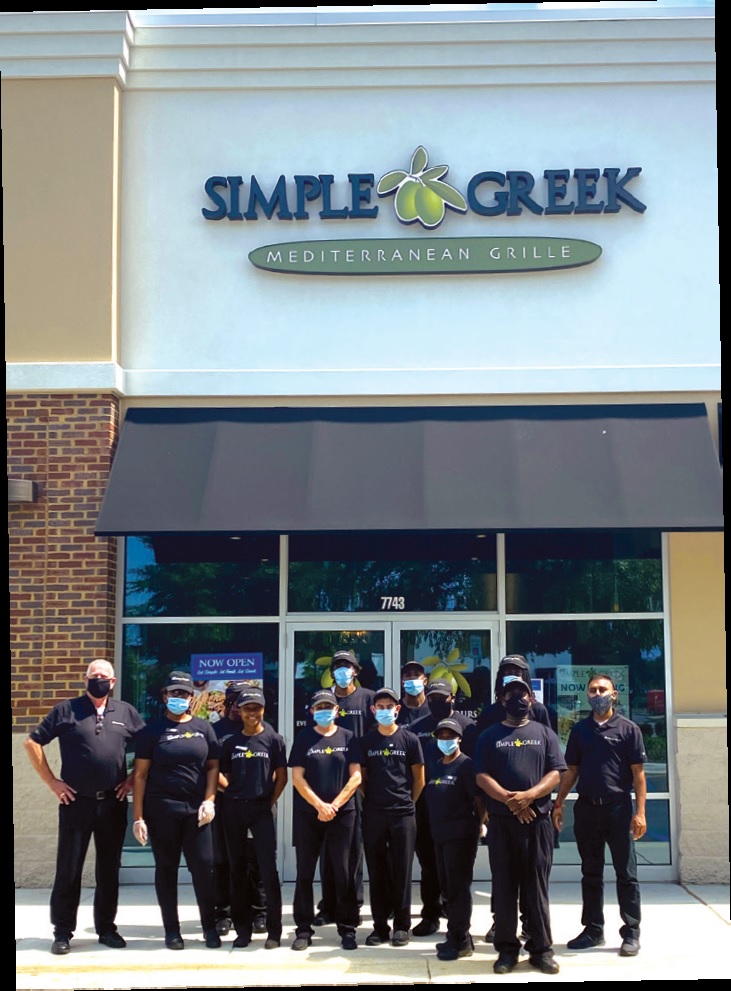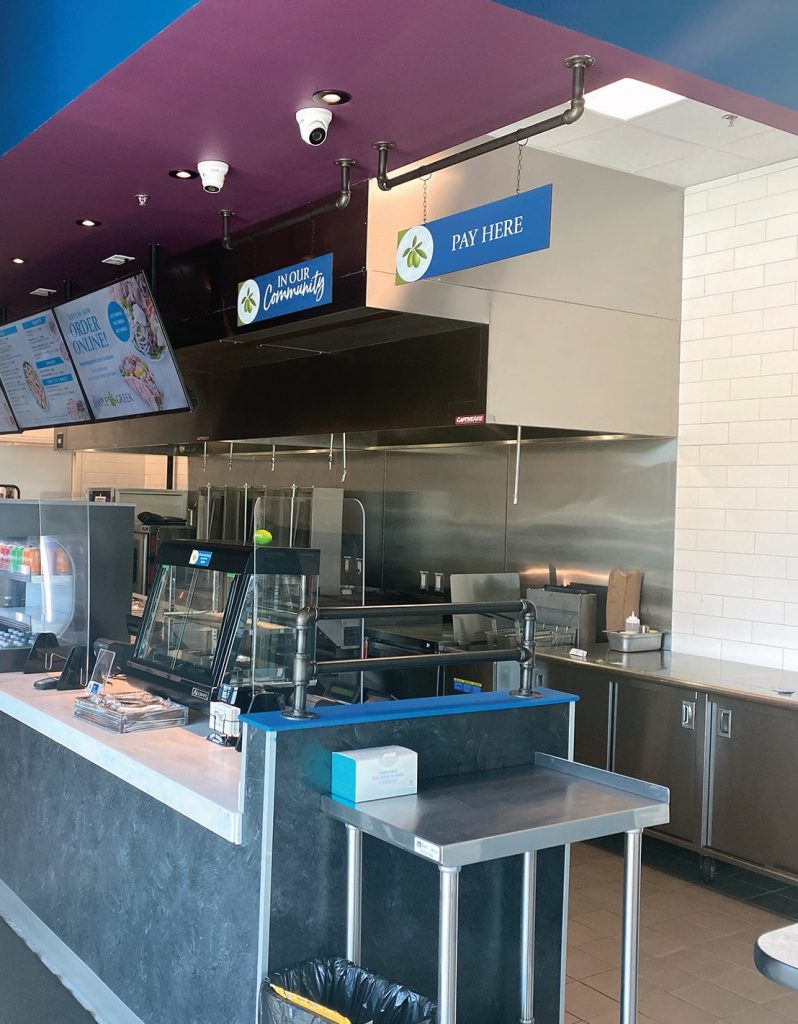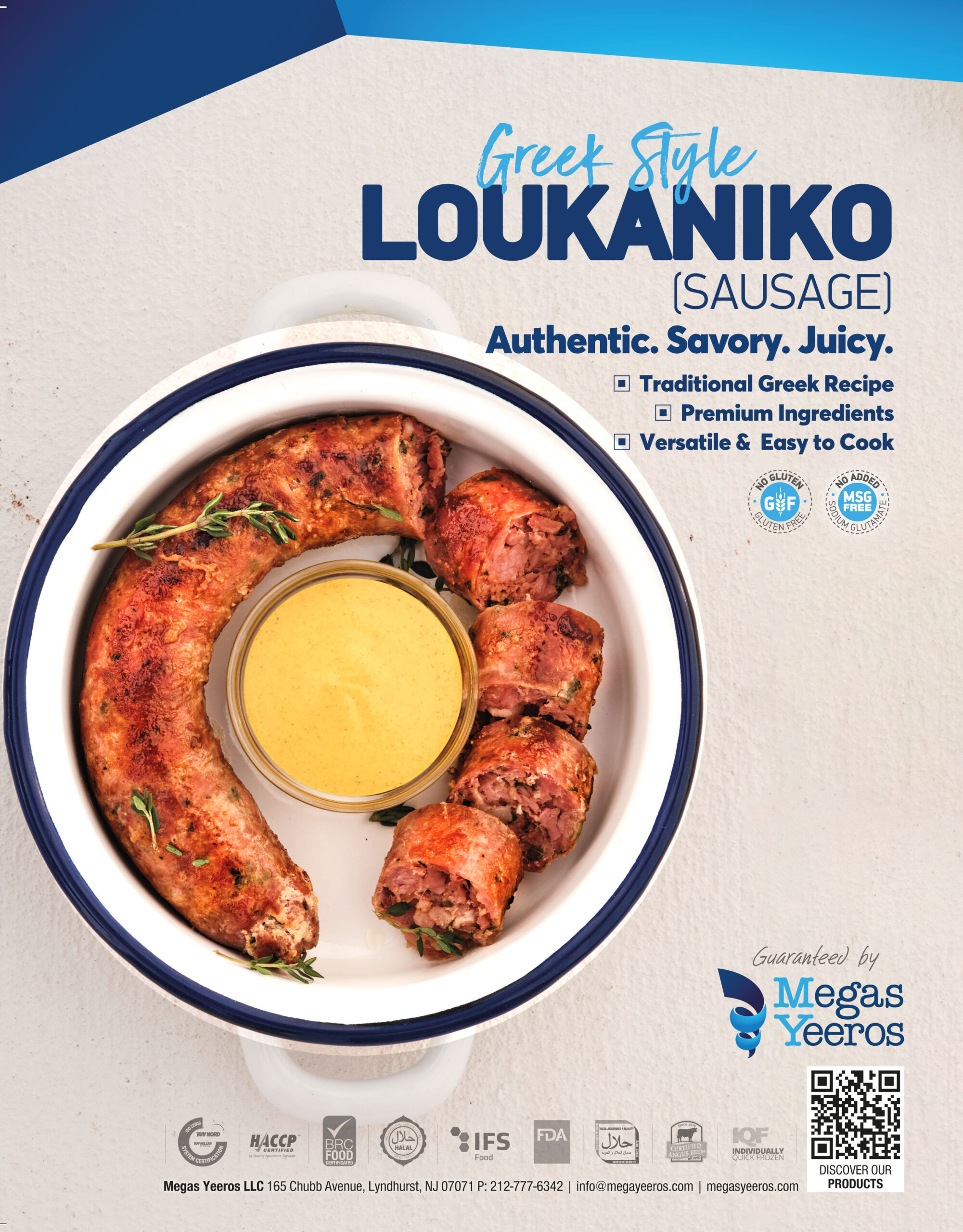Opening Acts
Posted by estiator at 6 September, at 07 : 54 AM Print
FEATURE
Despite the pandemic, restaurateurs across the country are opening businesses and expanding brands.
By Michael Kaminer
Even in normal times, opening a res-taurant is not for the faint of heart. As Estiator readers know well, factors from cash flow to fire safety to hygiene make food service especially complex. So it takes a special kind of tólmi to open a restaurant during COVID-19, when nothing feels normal. Still, restaurateurs are following their dreams, launching businesses and opening new locations in the midst of the pandemic. Some have succeeded. Some are facing huge challenges. And some have had to take a step back due to circumstances far beyond their control. Estiator caught up with five of them across the country.
NIKO’S SOUVLAKI
instagram.com/nikos_souvlaki, Astoria, NY
On the one hand, Nikolaos Lamprou couldn’t have picked a worse time to open his Astoria restaurant—April 6 was just weeks after lockdown started in New York, plunging the city into gloom.
On the other hand, the opening of Niko’s Souvlaki brought so much joy to the neighborhood that even The Wall Street Journal noticed—and gave Lamprou a glowing notice in May. A flood of media coverage followed.
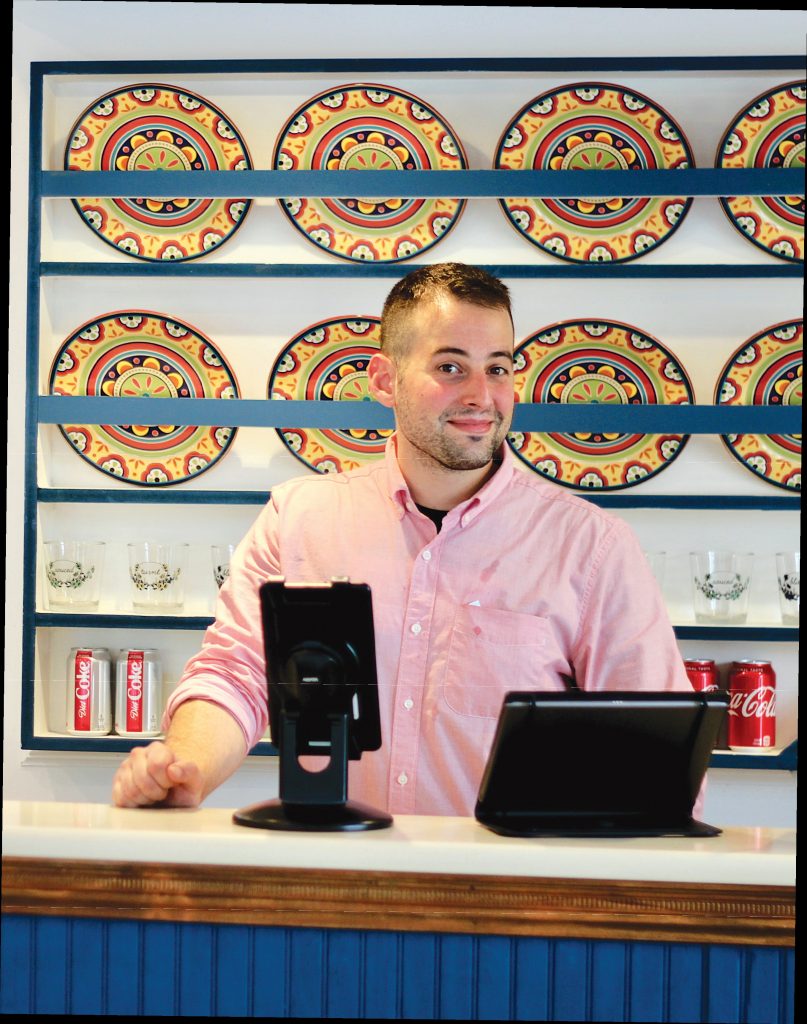
“We’re so grateful for that. It was excellent advertising for us,” Lamprou tells Estiator by e-mail. “Honestly, it was similar to that feeling when you’re at the gym doing your chest workout under the bar and someone gives you a push. After some of those pieces ran, people would walk in and say, ‘Hey, we saw you on the news’ or in the newspaper, which gave us a nice bit of confidence. We were so worried.”
Enthusiasm from his neighbors has also buoyed Lamprou at a tough time. “From day one, Astoria took us in, like a giant hug,” he says. “We feel this massive support every single day. People are happy that we took the risk and opened during this crazy season, and it’s been a reciprocal thing: them being excited about something new, us being excited about their support. Serving fresh food and meat and giving big portions of food gave us an edge, and people loved us from the beginning.”
What’s next for Niko’s Souvlaki, which serves house-made gyros, souvlaki, salads, and more?
“As always, we’ll continue putting our love and meraki into what we’re already doing, think positively about the future, and make plans for the next Niko’s Souvlaki location,” Lamprou says. “We’ve found a recipe that works, but we always want to improve, and we’ll continue to work even harder to satisfy even the most demanding customers.”
GREEK FROM GREECE
gfg-bakery.com

Georgios Drosos’ fast-casual phenom was on a roll before the pandemic hit, and the entrepreneur is not letting COVID-19 stop him. The chain, with offerings that range from spanakopita and strapatsada to French toast and omelets, is about to open restaurants in Kennet Square, PA, Philadelphia, and Rye, NY—with 40 more in development in the coming year.
“From the moment we faced the lockdown, we decided to see this new situation as an opportunity to discover new ideas,” says Drosos, who founded Greek from Greece in 2017. “We are working to achieve the same and even better performance, giving a lot of our attention to delivery and online ordering. We had already digital ordering and delivery before the pandemic, which have been increased the last months.”
At the chain’s new locations, an enhanced menu will build on the formula that Drosos has leveraged for success: Selections inspired by the Greek diet, built largely around fruits and vegetables, whole grains, yogurt, cheeses, and olive oil. The chain also imports most of its provisions from Greece. At new locations, Greek from Greece will branch out with halvah-based “superfood” desserts and a new range of its own branded retail products.
Rather than splashy grand openings, the new locations will launch with quieter—but no less effective—digital campaigns. “We focused on digital marketing and started to reach, prior of the opening, the audience of each new location with different digital tools. There is no reason to invest in grand openings right now,” Drosos says.
“Instead, you can spend less or the same amount and give a sample of the GFG experience to a larger audience,” he explains. “Working together with the franchisee or the store manager, we create an opening strategy that starts three months before the opening. Each store has a different personality that reflects not only the GFG concept but the management’s personality and business approach. We respect this diversity, and each time we adapt our strategy in a way that expresses it as well.”
Drosos’ predictions for the industry post-COVID? “Consumers’ preference for taking food away and delivering will continue to accel-erate,” he says. “Safety and sanitation are going to be significantly more important, and that will affect the packaging, the environment cleanli-ness, the cleaning materials and protocols, the service, and even the brands themselves.”
PALMETTO
palmetto-oakland.com, Oakland, CA
With apologies to Daniel Handler, we’ll call this one A Series of Unfortunate Events.
Uptown Oakland, where Christ Aivaliotis and his partners opened Palmetto in May, was a bus-tling, vibrant neighborhood anchored by iconic theaters like the Fox and the Paramount. “Des-olate” when Aivaliotis had moved to Oakland in 2002, the area had since been redeveloped into a lively quarter of restaurants, retail, and entertainment.

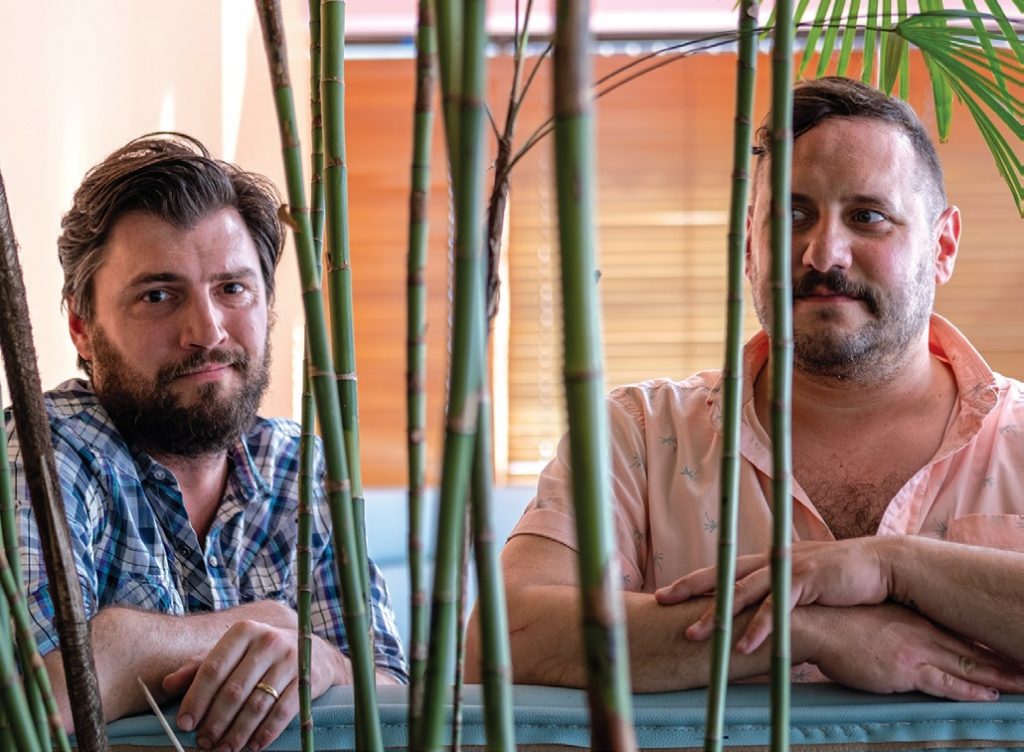
Palmetto’s Christ Aivaliotis (right) with his business partner
Palmetto, a Miami Beach-inspired steakhouse with Art Deco flavor, seemed like a sure bet. The partners invested in a pink marble bar, lush greenery, gold curtains, and a menu that included an indulgent prime rib dinner. Around the corner, the partners also own The Kon-Tiki Room, an uber-hip Polynesian-cool spot that’s been a runaway hit. Concertgoers provided a steady stream of evening business.
Palmetto was slated to open March 20. “But that never materialized,” Aivaliotis tells Estiator—it was the same day California went into lockdown. Paycheck Protection Program funds sustained a skeleton crew for a few weeks. The partners delayed Palmetto’s debut.
Palmetto finally opened its doors on May 11 with an abbreviated takeout menu. Its prime-rib to-go generated much media attention, including from CNN. Then Oakland’s massive street protests dealt another blow. “That disrupted business even more,” he says. “Instead of losing every dime, we decided to close and wait it out.” At press time, the restaurant remained shuttered.
While they await a reopening date for in-restaurant dining, Aivaliotis and his partners are preparing meals for World Central Kitchen, Chef Jose Andres food-relief organization. “It’s only $10 a meal for us, but it’s something,” he says.
“Based on what I see in the news, I don’t see things changing anytime soon,” Aivaliotis says.
“Our business was contingent on theaters being open. It’s so murky and vague. I’m even trepidatious to do outdoor dining. We got into this business to provide an experience. If we can’t offer that in the way we’d set forth to do, I don’t understand how that looks.”
THE SIMPLE GREEK
thesimplegreek.com, Montgomery, AL
Owned by legendary entrepreneur Marcus Lemonis, The Simple Greek now spans more than 30 locations nationwide, according to Ron Taylor, its chief operating officer. Its newest location, in Montgomery, Alabama, opened in July.
“It’s a little different for us,” Taylor tells Estiator. “The pandemic threw us a curve ball, with a unique set of circumstances. Instead of a sit-down restaurant, we created a hybrid. We’re offering limited seating inside, but the uptick in takeout and delivery meant moving the graband-go closer to the front door so they didn’t have to walk too far into the restaurant.”
COVID-19 also meant a change in training protocols for The Simple Greek’s team in Montgomery, Taylor says. “Typically, we bring everyone in and train them for a week leading up to a grand opening. Now we’ve had to do it in separate shifts, and our trainers are working 14-hour days. Everyone is wearing masks, and hand-washing is par for the course.”
The opening itself will also look different. “We usually open with a grand opening, but the challenge with aggressive promotions is that they can bring out large crowds,” Taylor says. “For the community’s safety, we didn’t feel comfortable with that. So we’re scaling back those promotions.”
The Simple Greek’s menu, like much Greek street food, is portable, which makes it especially suited for the moment, Taylor says. “Our difference is how much of the food is prepared fresh. Our sauces are made in-house. Our fries are fresh-cut. Our chicken gyro is 70% white meat and 30% dark, shaved from a spit. Our Village Salad mixes cucumber, onion, and tomato in a homemade marinade.”
Business at the Montgomery location has been “steady,” Taylor says. “It’s what we wanted. We had about 250 transactions in a five-hour window on opening day. It’s not crazy like we’ve seen in grand openings in normal times. But the balance here is between doing business well and doing it safely.”
XANTHI GREEK FOOD
xanthigreekfoods.com, Phoenix, AZ
Since its February opening, Xanthi Greek Foods has earned accolades for its gyros, souvlaki, and moussaka. Opened by entrepreneur Aise Montour and her sons, Jered and Jeysen Angous, the restaurant is named for the family’s ancestral hometown in Greece.
“Xanthi Greek Food isn’t the average corner gyro shop,” enthused AZCentral, a local news site, singling out the shop’s homemade sausages. “The Angouses make their loukaniko fresh on the premises, and it shows. This loukaniko has some serious character.”
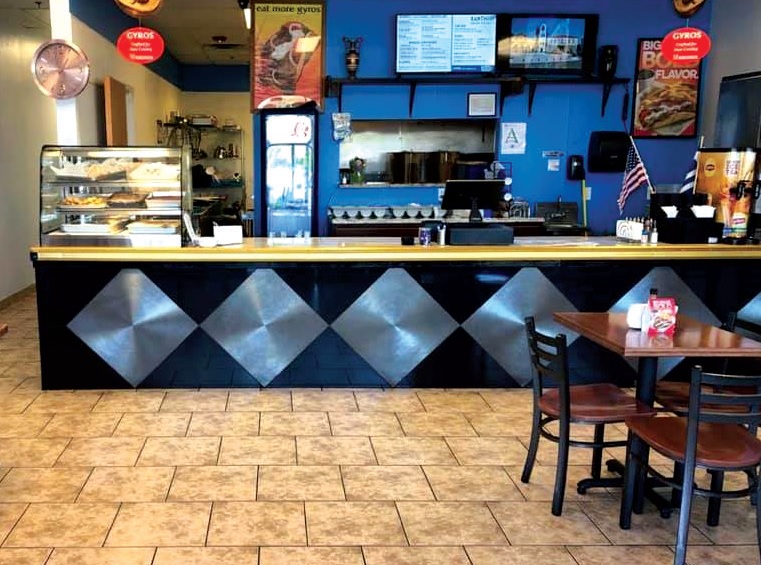
The pandemic wasn’t an issue when Montour and sons opened Xanthi Greek Food. But it’s become a factor now. Despite the accolades, it’s been tough going, Jered Angous tells Estiator. “We were doing OK. When we first opened, it was slow. It went up for a couple of weeks, then back down. It’s been that up-and-down since then, and it’s hard to predict which days will be busy or slow.” The restaurant’s traditional gyros, sausages, and souvlaki are top sellers, Angous says.
The family has had to raise prices, “because everything went up” once the pandemic spread, he explains. And the trio is relenting on third-party delivery apps, too.
“I don’t know what’s going to happen,” Angous says. “Hopefully, we’ll go back to normal. We go day by day.”

